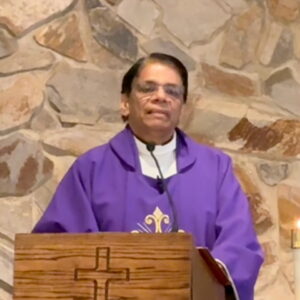The Liturgy this Lent has shown us the God of the Exodus. He is a mighty and gracious God, Who, out of faithfulness to His covenant, has done “great things” for His people, as today’s Psalm puts it. But the “things of long ago,” Isaiah tells us in today’s First Reading, are nothing compared to the “something new” that He will do in the future.
Today’s First Reading and Psalm look back to the marvelous deeds of the Exodus. Both see in the Exodus a pattern and prophecy of the future, when God will restore the fortunes of His people fallen in sin. The readings today look forward to a still greater Exodus, when God will gather in the exiled tribes of Israel that had been scattered to the four winds, the ends of the earth.
The new Exodus that Israel waited and hoped for has come in the death and resurrection of Jesus. Like the adulterous woman in today’s Gospel, all have been spared by the Lord’s compassion. All have heard His words of forgiveness, His urging to repentance, to be sinners no more. Like Paul in today’s Epistle, Christ has taken possession of every one, claimed each as a child of our heavenly Father. But our God is ever a God of the future, not of the past. We are to live with hopeful hearts, “forgetting what lies behind but straining forward to what lies ahead,” as Paul tells us.
Jewish law treated adultery as a serious crime since it violated God’s ordinance and the stability of marriage and family life. It was one of the three gravest sins punishable by death for the Jews. If Jesus said the woman must be pardoned, he would be accused of breaking the law of Moses. If he said the woman must be stoned, he would lose his reputation for being the merciful friend of sinners.
Jesus then does something quite unexpected—he begins to write in the sand. The word for “writing” which is used here in the Gospel text has a literal meaning “to write down a record against someone.” Perhaps Jesus was writing down a list of the sins of the accusers standing before him. Jesus now turns the challenge towards his accusers. In effect he says: Go ahead and stone her, but let the man who is without sin be the first to cast a stone. The Lord leaves the matter to their own consciences. When we are ready to be changed and transformed in Christ-like holiness, God never withholds his grace from us. His steadfast love and mercy are new every day. Through the gift and grace of the Holy Spirit we can be changed and made new in Christ. We pray that Jesus can set us free from our unruly desires and passions.
We shall prepare well for this coming Holy Week to receive His grace more and more in our daily lives by cleaning our Hearts and souls for him. Receive him with purity of heart so Easter will be a really joyful one for you this year.
Love and prayers,
Fr. Charley
